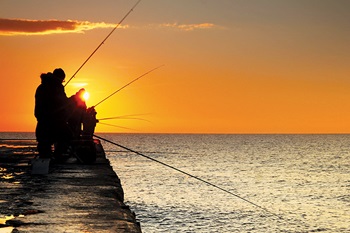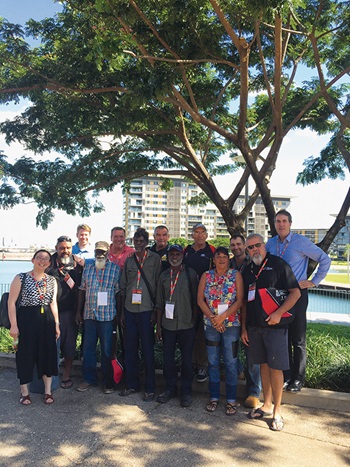
Going fishing provides many benefits to Indigenous communities, including strengthening the bonds of shared identity
By Anne Crawford
Indigenous peoples have fished the waters of Australia for millennia, yet little has been documented about the values and importance they ascribe to fishing.
A study overseen by the FRDC’s Indigenous Reference Group (IRG) has found that the pursuit goes way beyond a simple pastime and documents how fishing is regarded within different Indigenous communities. Researchers for the ‘Livelihood values of Indigenous customary fishing’ study are working with a range of Aboriginal people, including rangers and community members from the three communities being studied: the NSW south coast, far west South Australia and the Crocodile Islands in north-east Arnhem Land in the Northern Territory.
The director of native title, land and water research at the Australian Institute of Aboriginal and Torres Strait Islander Studies (AIATSIS), Rod Kennett, and research officer Luke Smyth are overseeing the study, which is still in progress. “Looking at it from a value perspective has helped to unravel how tightly tied up fishing is with all sorts of different things in these communities,” says Rod Kennett, the principal investigator on the project.
“It’s much more than enjoying it or eating it. It’s wrapped up in culture, especially when people identify themselves as ‘salt water people’, as quite a few family groups in all three regions do – they say ‘we need it; we can’t not eat it’.”
Focus on values
IRG executive officer Chris Calogeras says identifying values is a key area of the IRG’s research and development focus. “There needs to be a shift in understanding the values Aboriginal and Torres Strait Island peoples have, so non-economic values can be put on the table as part of conversations about resource use,” he says.
To that end, the IRG developed a scope for the study and put out an ‘open call’ to research groups to propose how they would approach it. A research group from AIATSIS was chosen to undertake the project because it was considered the group had a good track record in conducting effective and culturally appropriate research with Indigenous people.
The benefits from the broader fishing sector often extend far beyond the value of the actual catch. A recent FRDC-funded study conducted by the University of Technology in Sydney (FRDC research code: 2014-301) found that wild-catch fishing is important to the social as well as the economic lives of NSW coastal communities. Recreational fishers also derive a range of non-economic benefits such as relaxation and enjoyment from the practice of catching fish.
Understanding how Indigenous communities value fishing resources and fishing access is a key component to achieving greater participation of Indigenous people in commercial fishing. Uncovering these values means there can be an evidence base for allocation and resource-use decisions that take account of these values. The findings will help to facilitate the development of policy and regulations to enable greater indigenous engagement in the fishing sector by incorporating values held by Indigenous people in relation to fishing.
Local protocols
To conduct the study, researchers enlisted culturally appropriate ways of eliciting information. First, they developed a tailored interview process, consulting with the IRG and then those in the field, to refine survey methods suited to the study.
They drew on the knowledge of researcher Hayley Egan, who had been engaged in previous research commissioned by the FRDC into Indigenous Australians’ use of and access to fisheries resources. The study was then passed through the AIATSIS ethics committee.
The community-focused approach took into account considerations such as literacy levels, the language spoken, the need for translators and the cultural appropriateness of the questions, the way in which they were asked and who they were asked by.
People on Milingimbi Island and in other Crocodile Islands communities were interviewed, using assistance from Crocodile Islands rangers, with project materials translated into Djambarrpuyngu, the dominant local dialect of Yolngu Matha.
“We realised you can’t just make the questions the same for everyone or we’d miss out on some really important things. We talk to people first to get a sense of the big issues, then try to sort out what we needed to ask to tease out the best information,” Rod Kennett says. “We also give a verbal explanation of what it is we want to ask about so it’s clear, and also why we are conducting the interview and what the community might get back, so the benefits are two-way.”
The team made research agreements with each of the three communities to ensure that local people were employed for the project. Dozens of interviews were carried out across the communities. “People were really keen to have their stories heard and their values understood by the wider Australian community,” Rod Kennett says. “Quite a few people enjoyed being part of the interview process because they felt they had a story to tell that hadn’t been told before.”
He says the elderly fishers on the NSW south coast in particular loved talking about ‘the good old days’ when fish were so plentiful that you didn’t have to dive for abalone, you could just pick them off the rocks.
 Researcher Rod Kennett (far right at back) with researchers and delegates from the southern NSW coast and north-east Arnhem land communities involved in the study.
Researcher Rod Kennett (far right at back) with researchers and delegates from the southern NSW coast and north-east Arnhem land communities involved in the study. Community wellbeing
Rod Kennett says interim findings in the study identified several ways in which community wellbeing is connected to the ability to fish. For example, health is a big concern. “People talked about the nutritional benefits of eating fresh fish, particularly the elderly, young people or if you were disabled or sick,” he says.
They mentioned the health and physical values involved in fishing, and believed their health suffered if they were prevented from doing this. The importance of going out fishing ‘on country’ resonated. There were also social values attached to the activity.
“Fishing promotes community wellbeing and cohesion. People are able to follow traditional rules about sharing, and pass down a whole body of knowledge and laws about fishing,” Rod Kennett says.
Sharing is an intrinsic part of the culture. Fishing is often a family affair and the catch could be distributed between 30 or 40 people – family first and elders, the ill, disabled or anyone not able to fish themselves.
“It’s important too for people to be able to take the kids out. They talk about young people being engaged in a productive activity.”
Community access
The survey has also helped galvanise people involved in the study to act on plans to gain greater access to fishing areas. For example, the Yuin people are making a case to the NSW Government to establish a fishing co-operative, possibly to catch abalone.
Under their proposed model, the co-op – rather than an individual – would hold a licence and would employ a number of young people.
The study is due for completion at the at the end of the year, with interim results being presented at conferences throughout 2017.
An exhibition of photos will be launched in June to support it, including pictures of shing from the AIATSIS collection, those taken in the eld during the project and as part of a competition designed to engage local people.
More information
Rod Kennett, rod.kennett@aiatsis.gov.au





